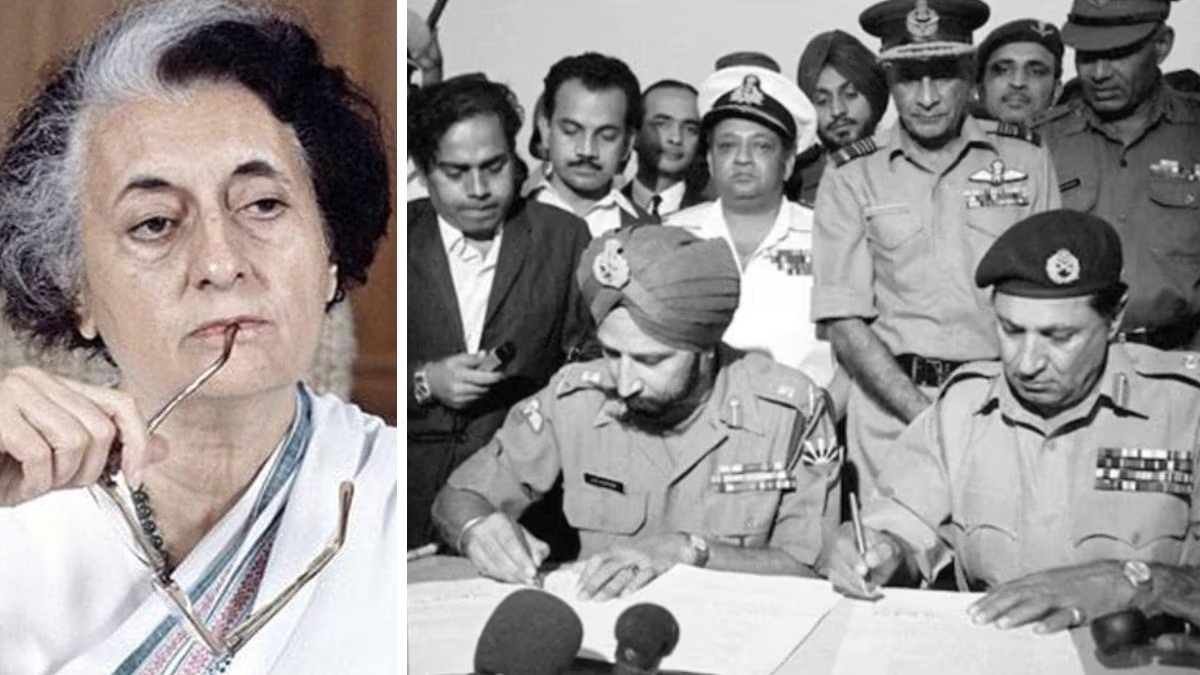In 1971, India decisively defeated Pakistan, splitting it into two parts. This was the pinnacle of Indian military strength and diplomacy. It is said that then Prime Minister Indira Gandhi was praised by Atal Bihari Vajpayee as a goddess Durga for this feat. The success of the Indian Army and Gandhi's leadership in international diplomacy during the 1971 war was witnessed worldwide. Even today, when photos of 93,000 Pakistani soldiers surrendering are seen, it instills a sense of pride in every Indian. However, after the coup in Bangladesh, there's a renewed evaluation of that historic event. Journalist Madhu Kishwar referred to the creation of Bangladesh as Indira Gandhi’s blunder on social media platform X.
1. Can the Military Skill of the Indian Army and Indira Gandhi's Diplomacy Ever Be Forgotten?
Renowned Bangladeshi author Haroon Habib once wrote, "The diplomatic and personal role of former Indian Prime Minister in the 1971 Bangladesh Liberation War is inseparable from the country's history." About 14 years ago, Sheikh Hasina posthumously honored Mrs. Gandhi with Bangladesh's highest award, the Swadhinata Samman. She was the first foreigner to receive this honor. Indira Gandhi worked on three fronts - political, diplomatic, and military.
On one hand, Gandhi supported the exiled military and guerrilla movement, the Mukti Bahini, which was trained and funded by the Indian Army. She took the advice of Field Marshal Manekshaw and delayed the attack on the Pakistani Army, a decision that many military experts and diplomats still critique. Indira's decision to agree with Manekshaw led to the Indian Army's triumph. The time she gained was used wisely to write letters to world leaders, highlighting the plight of refugees and awakening the international community's conscience on the massacre in Bangladesh. However, a major Pakistani ally, the United States, remained silent. Gandhi herself visited Germany, France, Britain, Belgium, and the US for 21 days. Kumi Kapoor of the Indian Express wrote that she had to face the wrath of President Nixon and Secretary of State Henry Kissinger in the US for highlighting East Pakistan's dire straits. Later, in conjunction with the Mukti Bahini, the Indian Army acted swiftly. It took just two weeks to capture 93,000 Pakistani soldiers and win the war. Gandhi was unafraid even when the United States sent its powerful Seventh Fleet into the Indian Ocean. After winning, members of parliament gave Gandhi a standing ovation.
2. But Madhu Kishwar's Opinions Also Hold Weight
Madhu Kishwar writes, "What I am suggesting is different from the established narrative regarding Bangladesh's birth, so it's necessary to understand it with an open mind." She claims that since Nehru, excluding Lal Bahadur Shastri, Indian prime ministers have poorly played the geopolitical power game. They lacked a basic understanding of Islam and were unaware of factors weakening India. Gandhi's actions inflicted irreparable harm on Hindus in the Indian subcontinent.
Kishwar argues that Pakistan was economically strained trying to retain East Pakistan as a colony. The people of East Pakistan were viewed as inferior by West Pakistanis. By liberating East Pakistan into a separate nation, India relieved Pakistan of an economic burden. The continuous rebellion in East Pakistan stressed the Pakistani armed forces. After Bangladesh's creation, Pakistan was relieved of the economic and military strain of maintaining a distant region.
3. The Potential Prolonged War Between East and West Pakistan
Kishwar contends that without Gandhi's intervention on behalf of East Pakistani Muslims, they would have fought the Pakistani army for decades. With limited weaponry, this struggle would have persisted indefinitely. The ongoing war between East and West Pakistani Muslims would have benefitted India. It would have weakened the Pakistani army and rendered Pakistan bankrupt. Pakistan would neither have had the time nor energy to attack India. Kishwar argues that India should have silently watched the two factions destroying each other instead of intervening as protectors of East Pakistani Muslims.
Given that Bangladesh was a Muslim-majority state, Bengali Muslims harbored deep animosity against Hindus post-1947 partition. Hence, the Hindu population decreased from 30% in 1947 to approximately 8% today, indicating that East Pakistani Muslims are as intoxicated by jihad and kuffar-phobia as the Pakistanis.
While fighting Urdu dominance, East Pakistanis claimed their Bengali linguistic identity. However, post gaining independence based on linguistic identity, Pakistan found a cheap strategy to control the new nation's politics by releasing petro-dollar funded radical Tablighis from Arab countries. This revived the post-1947 legacy of hatred against surviving Hindu kuffars.
4. Stop Romantically Depicting the 1971 Liberation of Bangladesh
India needs to shed the pride that it created Bangladesh. This pride hampers relations with Bangladesh. C. Rajamohan writes, "No matter how tragic, Delhi must stop romanticizing the 1971 liberation of Bangladesh." Bangladesh is deeply divided over its historical interpretation, a reality Delhi cannot ignore. Various forces in Bangladesh disagree with Sheikh Hasina’s narrative of liberation. The opposition in Bangladesh leverages this division. Apart from the Awami League, all political leaders in Bangladesh are anti-India. Khaleda Zia's supporters still believe Bangladesh should have remained part of Pakistan.
The backlash against Sheikh Hasina’s relentless efforts to impose her narrative is evident in the attacks on Hindus.




